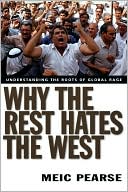

 |

|

The average rating for Why the Rest Hates the West: Understanding the Roots of Global Rage based on 2 reviews is 5 stars.
Review # 1 was written on 2012-02-24 00:00:00 Peter Fuentes Montoya Peter Fuentes MontoyaThough it is now 8 years since Meic Pearse released Why the Rest Hates the West, I know this book is useful information today and I am sure it will continue to be for quite some time. This work helps peoople in the Western world understand why people in the Middle East are resisting American influence in their world, to fanatical and even violent proportions. Early in the book he makes effort to show that he does not agree with a lot of their behavior but he knows that it is important we understand the roots of their anger. Early in the book he tells the story of a terrorist driving a truck of explosives in 1983 into the marine barracks in Lebanon. Just before he blew himself up the guard reported he was smiling! Why would he be so eager to kill? We are next given some insight when he tells us a story of young Western mission workers in Algeria. One evening they were sitting around a fire reverently singing. An elderly man walked up to them and asked why they were acting in a way that struck him as odd. He explained he expected westerners to be playing loud music, dumping litter and showing lots of skin. This is a clue of why there is so much resentment to the West in the Middle East. To them, American comforts are a sign of undermining the traditions and moral principles they treasure. Mr. Pearse shows this attitude appears odd to us because we have arrived at our relaxed moral codes only after centuries of developing thought patterns. He takes us from Europe's Reformation in the 1500's, through the rigid world of Victorian England, the era of romanticism of the 19th century until we have arrived at a time when the common belief was the hypocrisy of the old Victrians was the ultimate evil. Pearse turns this idea on its head and declares the only way for a land to be moral is have an evironment where hypocrisy is possible. A culture that labels few things as wrong can eventually decay into a land where nothing is seen as wrong. It is in this manner that non-westerners see us. As you read his chapters it is clear he understands how these people think. He willingly shares with us the objections we should have against them but shows us why their bad behavior exists. In many nations of the Middle East, for example, it is common for law enforcement to expect bribes. But it is nevertheless tolerated because to them, corruption is the cheapest form ot taxation. And so they claim, we have the virtues we claim, only because we in our excessive wealth can afford to have them. Thus he encourages us to interact with these people, visit their countries and dialogue with them on an idividual level. It is only by gaining insight into their world, that any discussion will be possible. In light of that, I condider this work a book of hope. |
Review # 2 was written on 2012-03-25 00:00:00 Allen Denver Allen DenverDespite the title, the book says much about how Western culture developed into modernity and post-modernity, and how that impacts Westerners on many levels, and little about how all this explains "the roots of global rage." Pearse also does a good job explaining how traditional (pre-modern) cultural values make sense in their context and are in many cases more stabilizing than Western ones. The title topic is certainly touched on, but no more. Even where the cultural differences are cited as the cause of this rage, there is little exploration of alternative hypotheses such as competition for resources, perceptions of exploitation, jealousy, and, in the case of political Islam at least, a specific goal of defeating Western culture and bringing a different one into play even in "Western" countries. Despite this, the book is a brief, well-written, well-structured look at the development of Western values and modes of thinking that we now take for granted. It raises many questions about whether some of these values promote our survival or are ultimately self-destructive. An example of a Western cultural value Pearse discusses is that of progress. He shows how, until roughly the 18th century at least, social and political legitimacy depended on tradition, links to the past, so that change was either rejected or justified as a way of getting back to a past golden age. This pattern still is the common one in traditional societies. Since that time, though, progress has become a underlying assumption -- everything is getting better over time. One result of this is a devaluation of tradition, ancestors, and our history, which are all now seen as simple, unenlightened, oppressive, and so on. This attitude is so at odds with all the rest of the world that it contributes to the rest's dismay over what it sees as the West's anti-value stance. Good reading, at a popular level. The ideas are quite important for all Westerners (especially since the survival of Western culture is one of the questions in doubt) and particularly for anyone working in a cross-cultural situation. It is written from a Christian perspective but in such a way that it neither evangelizes for that perspective nor makes it necessary for the sense of the book. |
CAN'T FIND WHAT YOU'RE LOOKING FOR? CLICK HERE!!!